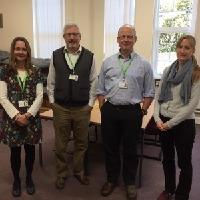Sam Johnston is the County Archivist at Dorset History Centre
I think I'm stating what's known colloquially as the 'bleedin' obvious' when I say that digital preservation has presented a raft of challenges for small to medium sized archive services, most of which have undergone significant budget reductions in recent times. It's an area of work that is outside the skill-set and certainly the comfort zone of many, and in budgetary terms, it represents something that is likely to require additional funding, often very hard to secure. Therefore, a technical challenge combined with a relatively glum financial picture has meant that it has been difficult to understand how small services can begin to grapple with digital preservation. One thing I think we all acknowledge is the importance of digital preservation and that archivists should be the professionals to lead it as a clear continuation of our work with the physical records. The risk, as it appears to me at least, is that if we don't take the lead, then it will default to some other sector to pick this up and we risk becoming heritage 'time capsules' of hard copy records only.
Dorset History Centre has been using Preservica Cloud Edition software for five years. This followed the appointment of an archivist with specific responsibility for digital preservation. There have been significant challenges to overcome - questions of security, the ongoing need to fund the contract, bandwidth etc, but we have been able to make some real progress in ingesting important records including 30,000 digitised adoption files which have to remain accessible for a minimum of 100 years.
Around the same time, a grouping of 11 English local authority services known as Archives First, came together to consider matters of mutual interest. High on the list of priorities was digital preservation. With support from The National Archives, a report was commissioned which looked at the role of local services and the archivists working within in them in delivering practical solutions to digital preservation. What emerged strongly from this work was that although there was a good deal of enthusiasm and willingness to try and test solutions, there was a strong sense too that as small services, working independently from each other, it was difficult to find a way of taking the work forward. What also became apparent was that for most services, the prospect of using open source tools, although very appealing on one level, was an impossibility due to the specialist IT knowledge required to customise the system for local use. Preservica has made it possible to form a consortium with up to 11 members. Currently, Dorset is collaborating with Wiltshire and West Sussex, each making a financial saving and each having a discrete digital repository. We have strong interest from a range of other services who are likely to join on or before April 2019.
There are two key benefits as I see it. On the one hand small, often poorly-resourced services are able to collaborate and benefit through economies of scale and shared experience. On the other hand, a real advantage is that geographical location in no way precludes membership. Before long, we hope to have members from at least three English regions as members. It feels like a small, but important departure in our attempts to understand and deal with the challenge of digital preservation, and one that I hope can be sustained into the future.
